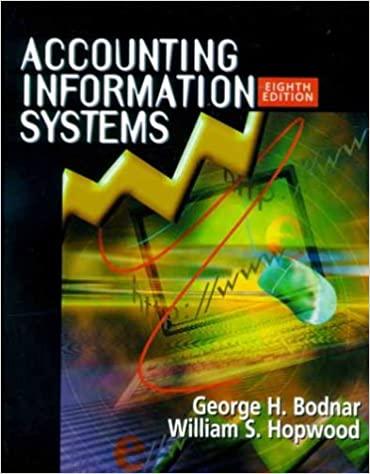Prepare for January, February and March: 1. Sales budget
2. Purchases budget
3. Selling & administrative expense budget
4. Cash budget
5. Budget/performance income statement 6. Budget/performance balance sheet

Lily Company Master Budget Practice Problem (includes Taxes) 1. Lily Company expects its Sales in January to be $120,000 and expects Sales to grow by 10% each month. 75% of sales are credit sales and the remaining 25% are cash sales. 2. The company collects 60% of credit sales in the month of the sale, the remaining 40% in the month after the sale. 3. The cost of goods sold is equal to 70% of sales. 4. Lily Company likes to keep an ending inventory equal to 20% of next months cost of goods sold. 5. All purchases of inventory are on account, and the company pays for 80% of all purchases in the month of the purchase, 20% in the month after the purchase. 6. The company pays its sales force a commission equal to 6% of sales. 7. The company also believes that its supplies expense is equal to $5,000 plus 1% of sales. 8. Rent is $4,000 per month, Advertising is $3,000 per month, Depreciation is $3,000 per month, and Utilities are $2,500 per month. 9. The company purchased an insurance policy covering 12 months for $24,000 on January 1. 10. All selling and administrative expenses are paid in the month they are incurred except for commissions that are paid in the month after they are earned and the insurance which is paid one year in advance. 11. On January 31, Lily Company purchased Land costing $38,000. Lily paid cash for the land. 12. Interest on long-term debt is equal to 1% of the beginning balance and is paid each month. The company must maintain a minimum balance in cash of $10,000 and will use any cash surplus to pay down long-term debt. The company borrows cash in $1,000 increments. 13. The company is subject to a 25% income tax rate. The company pays income taxes in the month after they are accrued (expensed). 14. In January, the company will declare a $2,500 dividend, that it will pay in February 15. The company had a beginning balance sheet (as of January 1) as follows: ASSETS: Current Assets Cash $10,000 $44,000 0 $16,800 $70,800 Accounts Receivable Prepaid Insurance Inventory Total Currents Assets Property, Plant, & Equipment Land Equipment Accumulated Depreciation Total PPE LIAB & STOCKHOLDERS EQUITY Current Liabilities Accounts Payable Commissions Payable Income Taxes Payable Dividends Payable Total Current Liabilities Long Term Debt Stockholders Equity Common Stock Retained Earnings Total Stockholders Equity $15,680 $6,600 $1,000 $-0- $23,280 $60,000 $10,000 $40,000 ($20,000) $10,000 $7,520 $30,000 $100,800 $17,520 $100,800 Total Assets Total liab & SE Lily Company Master Budget Practice Problem (includes Taxes) 1. Lily Company expects its Sales in January to be $120,000 and expects Sales to grow by 10% each month. 75% of sales are credit sales and the remaining 25% are cash sales. 2. The company collects 60% of credit sales in the month of the sale, the remaining 40% in the month after the sale. 3. The cost of goods sold is equal to 70% of sales. 4. Lily Company likes to keep an ending inventory equal to 20% of next months cost of goods sold. 5. All purchases of inventory are on account, and the company pays for 80% of all purchases in the month of the purchase, 20% in the month after the purchase. 6. The company pays its sales force a commission equal to 6% of sales. 7. The company also believes that its supplies expense is equal to $5,000 plus 1% of sales. 8. Rent is $4,000 per month, Advertising is $3,000 per month, Depreciation is $3,000 per month, and Utilities are $2,500 per month. 9. The company purchased an insurance policy covering 12 months for $24,000 on January 1. 10. All selling and administrative expenses are paid in the month they are incurred except for commissions that are paid in the month after they are earned and the insurance which is paid one year in advance. 11. On January 31, Lily Company purchased Land costing $38,000. Lily paid cash for the land. 12. Interest on long-term debt is equal to 1% of the beginning balance and is paid each month. The company must maintain a minimum balance in cash of $10,000 and will use any cash surplus to pay down long-term debt. The company borrows cash in $1,000 increments. 13. The company is subject to a 25% income tax rate. The company pays income taxes in the month after they are accrued (expensed). 14. In January, the company will declare a $2,500 dividend, that it will pay in February 15. The company had a beginning balance sheet (as of January 1) as follows: ASSETS: Current Assets Cash $10,000 $44,000 0 $16,800 $70,800 Accounts Receivable Prepaid Insurance Inventory Total Currents Assets Property, Plant, & Equipment Land Equipment Accumulated Depreciation Total PPE LIAB & STOCKHOLDERS EQUITY Current Liabilities Accounts Payable Commissions Payable Income Taxes Payable Dividends Payable Total Current Liabilities Long Term Debt Stockholders Equity Common Stock Retained Earnings Total Stockholders Equity $15,680 $6,600 $1,000 $-0- $23,280 $60,000 $10,000 $40,000 ($20,000) $10,000 $7,520 $30,000 $100,800 $17,520 $100,800 Total Assets Total liab & SE







